PHONO POLITICS

The Phonograph in Politics - History and Humor
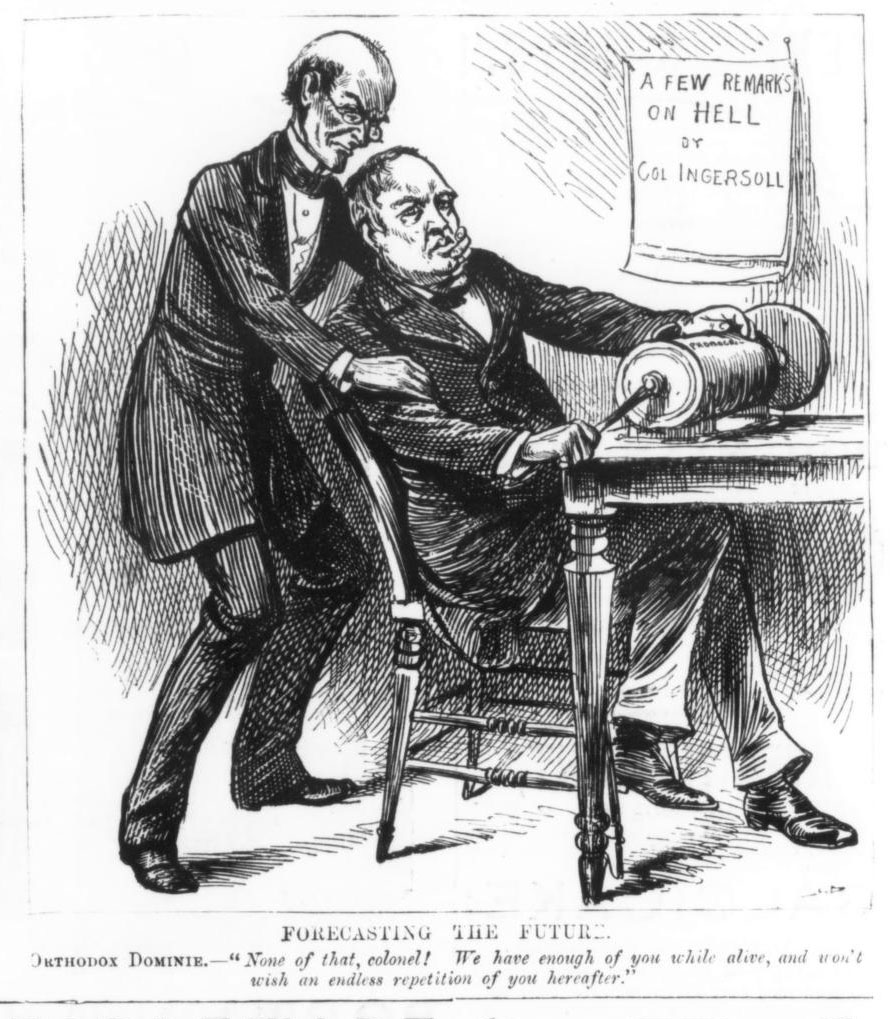
This woodcut is from "Frank Leslie's Illustrated Newspaper," May 4, 1878.

In 1871, Mary Potts of Ottumwa, Iowa,
revolutionized the industry by patenting an iron with a detachable
handle. This newspaper woodcut is from June 1, 1878. See Phonographia
Factola for this ad.

"His Satanic Majesty
Takes a Hint from "The Mikado" - How he will make the punishment
fit the crime" Puck, March 1886
"The Congressman
who is forever prosing,
Of speeches shall have
no stint -----
His own shall be ground
the whole year around,
And without any "leave
to print."

"The Daily Graphic, March 23, 1888. Political cartoon showing views of Senator Ingalls, Evarts, and speeches given through graphophone. Engraving by H.J. Botthof. (Library of Congress).

John Withrow advising "The
Wonderful Perfected Phonograph" to be very careful what it says in
its speech about Commercial Union (from The Grip Sept. 22,
1888, p. 6). - Courtesy The
Canadian Antique Phonograph Society (CAPS)
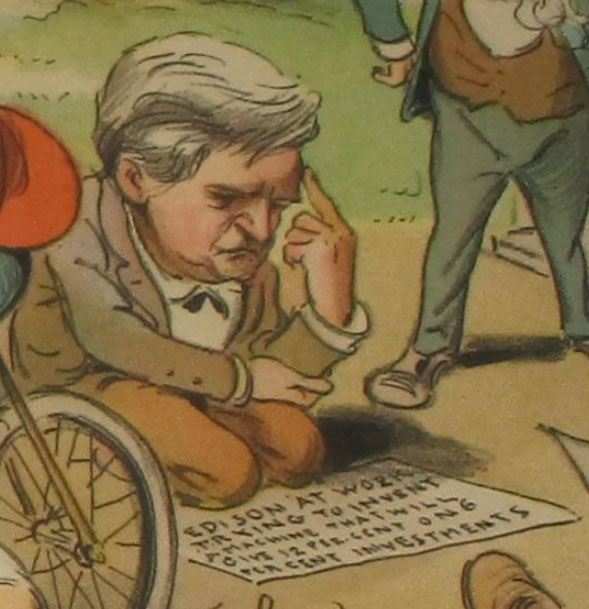
Edison at work trying
to invent a machine that will give 12 percent on 6 percent investments.
Extract from Judge
1997 lithograph by Grant Hamilton showing "What Some Of Our Prominent
Men Are Doing For The Benefit of the Public -- and Incidentally For
Themselves" (figures included William McKinley, J.P.Morgan, Thomas
Edison, and others).


"Oratory Made Easy,"
The Phonogram October 1892

Celebrity and political
Impersonation speeches (e.g., McKinley original Speech is what Brainey
is currently recording) Judge, June 1897

The Phonoscope
May, 1898
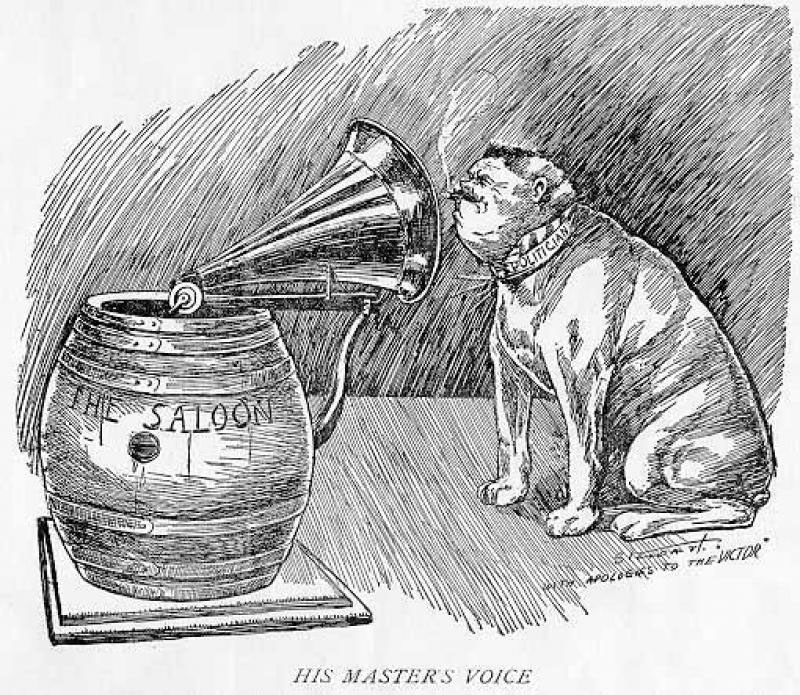
Temperance and Prohibition,
His Master's Voice, 1904 (Courtesy of Ohio
State University) (from Prohibition Cartoons by D.F. Stewart and
H.W. Wilbur, Defender Publishing Company, 1904

Duma - Reprinted from
New York World, The Talking Machine World, June 1906
This cartoon relates to
the Duma, the newly organized Russian parliament, and the Czar of
Russia, showing the "Russian people as making new strides toward
freedom of thought, consicence
and political rights."
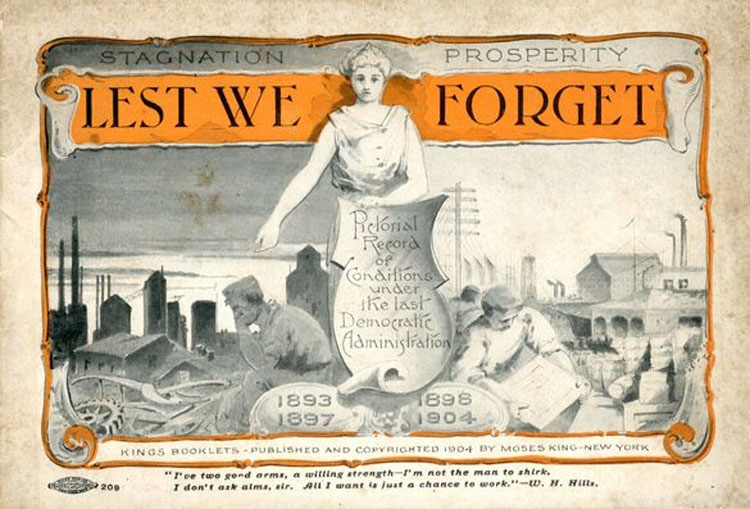
Lest We Forget Pictorial
Record of Conditions Under the Last Democratic Administration (1904)
Stagnation - Prosperity. This 16-page
pamphlet features a selection of political cartoons/illustrations
published in Harper's and Leslie's Weekly in 1893-1894
editorializing the failure of policies under the second Grover Cleveland
administration (though Cleveland's name is never explicitly mentioned).
Published by Moses King of New York
in 1904, it may have been distributed in an effort to strengthen President
Theodore Roosevelt's second term campaign. An interesting slice of
the societal unrest at the time, the cartoons and accompanying text
depict the plight of the unemployed and hungry, financial panic in
the Stock Exchange, strikes and work stoppage across the country,
and police violence against unemployed rioters, among other things.
7-1/2" x 5", 16 pages, saddle-stitched, B&W with orange.
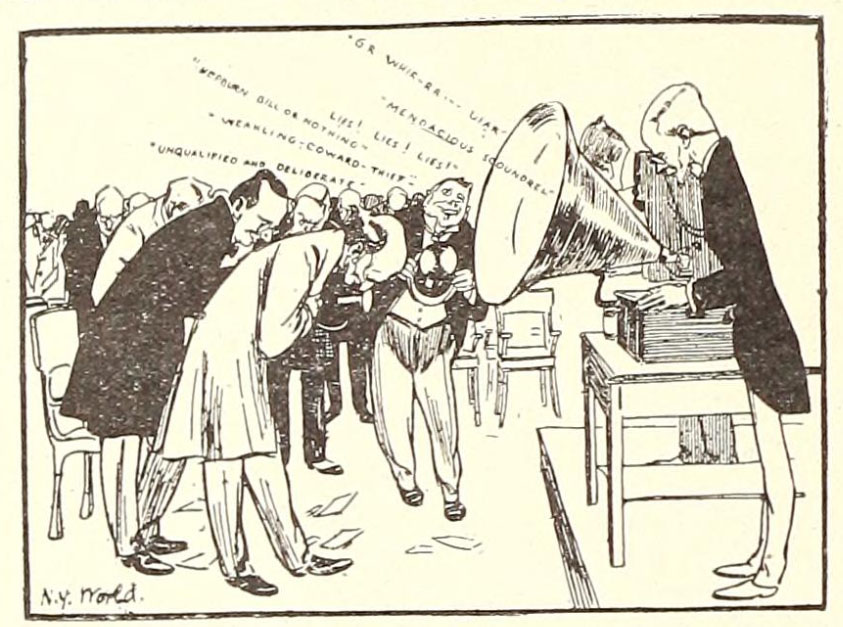
"Liar!" "Mendacious
Scoundrel"... Reprinted from New York World, The
Talking Machine World, June 1906
This cartoon is said to
"bear upon the recent deplorable controversy at Washington, in
which Annanias played a leading role."

His Master's Voice -
William Jennings Bryan running again in 1908

1908 Campaign Button
- Bryan vs. Taft (Courtesy Heritage
Auctions)
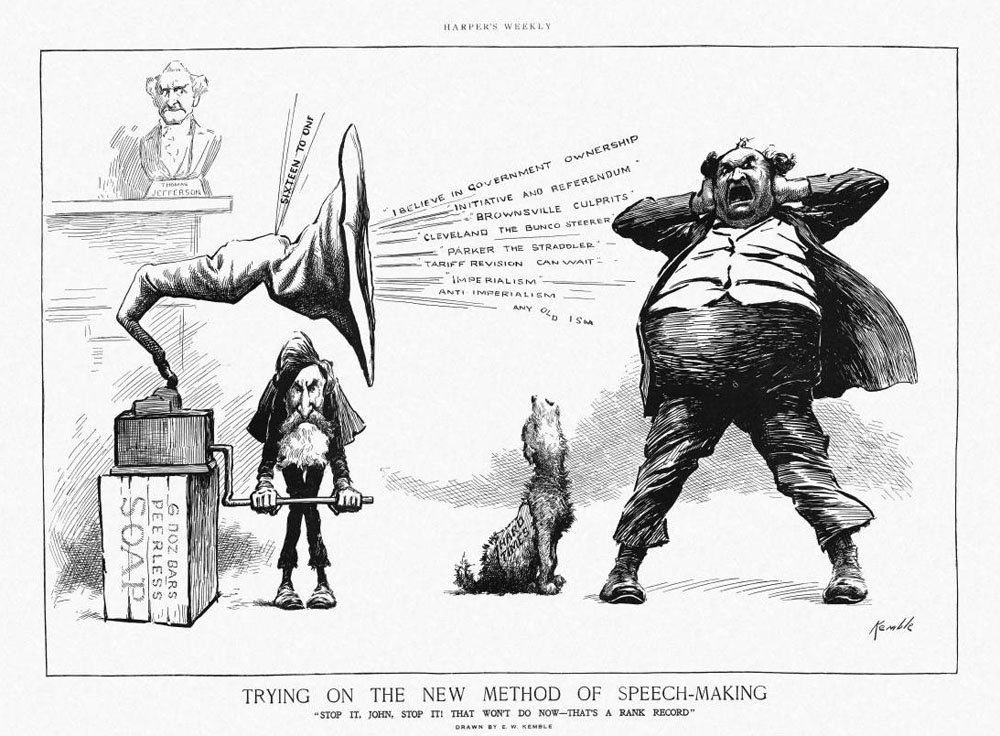
Harper's
Weekly, 1908
In 1908, for
the first time in history, Americans could listen to the recorded
voices of the presidential candidates, Republican William Howard Taft
and Democrat William Jennings Bryan.
In this cartoon,
Bryan reacts in horror to his own statements for "government ownership,"
"initiative and referendum," and "any old ism"; his criticisms of
previous Democratic nominees, President Grover Cleveland and Alton
Parker; and his contradictory comments for and against imperialism.
Bryan bellows
to his vice-presidential running mate, John Kern, who is turning the
gramophone, to stop the infernal racket. Between them the dog of "hard
times" wails, while on the shelf (upper-left) a bust of Andrew Jackson,
on a base inscribed "Thomas Jefferson," casts a distressed glance
at the party's current standard-bearer.
(Text source:
Harpweek.com cartoons - litho from the phonographia.com collection

Edison
Phonograph Monthly, August 1908
William Jennings
Bryan, in his Presidential bid of 1908 recorded a series of cylinder
phonograph records for the Edison Phonograph Company. In this cartoon,
Taft is seen complaining that he has missed out on this innovative
campaigning. The Edison Phonograph Monthly in September 1908, however,
announced the release of 12 Edison Records by William H. Taft made
at Virginia Hot Springs, after Mr. Taft delivered his speech of acceptance
at Cincinnati. The EPM called this an announcement of great importance,
noting that "no matter how the November election may result we
shall have Records by the next President. This makes new history.
It indicates progress."
Making
the Taft Records
The morning papers
were filled with accounts of Taft's 'canned speeches.' Everybody ...
was discussing them as well as the report that Mr. Bryan said the
opposition had stolen his campaign thunder. They all seemed greatly
interested in the part that the Edison is playing in the Presidential
campaign.
...both Messrs.
Bryan and Taft gave the Edison first choice for introducing their
personal views into American homes. Was ever such a compliment paid
a talking machine?
As reported by
The Edison Phonograph Monthly, September 1908

1908 Taft vs. Bryan
Presidential Campaign on Victor Records (courtesy of
phono78
blog)

The Talking Machine
World, August 15, 1908
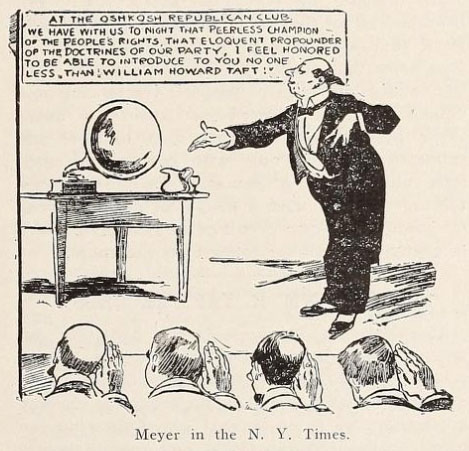
Reprinted in Talking
Machine World, August 15, 1908

Life, March
3, 1910

Life, June 16,
1910

Palace Preparation Practice,
January 5, 1910, Berryman Political Cartoon Collection, The U.S. National
Archives
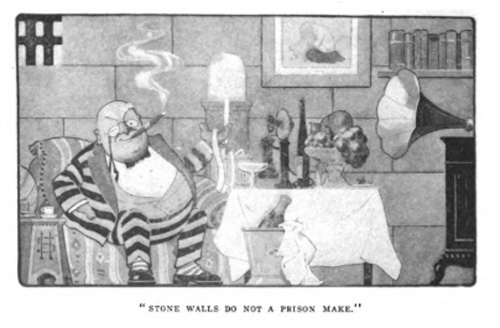
Life, September
15, 1910

Life,
December 6, 1910
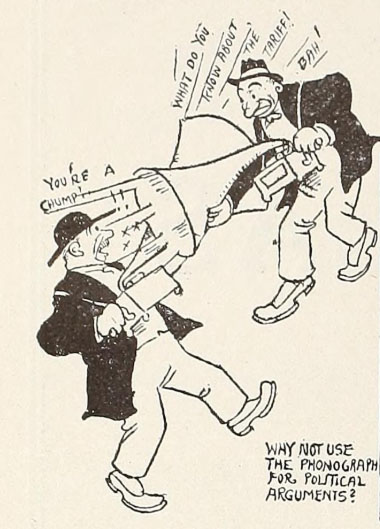
The Talking Machine
World, December 15, 1911

The Talking Machine
World, December 15, 1911

The Lincoln Daily
Star, July 4, 1912

Postcard of hand-drawn
cartoon of William Jennings Bryan's New Phonograph for 1912, Postmarked
1912
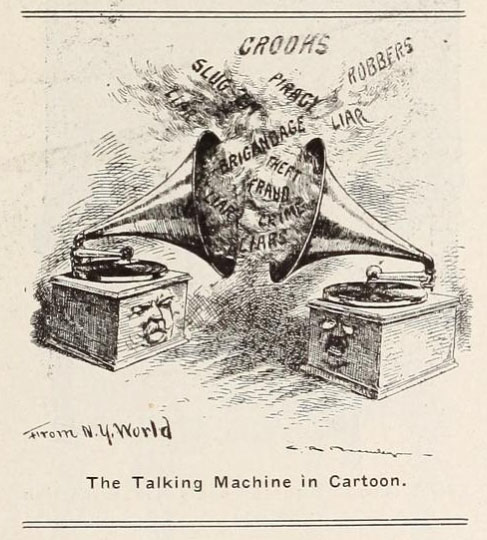
Reprinted from the New
York World, "The Talking Machine in Cartoon," - President
William Howard Taft and Theodore Roosevelt name-calling, The Talking
Machine World, July 15, 1912
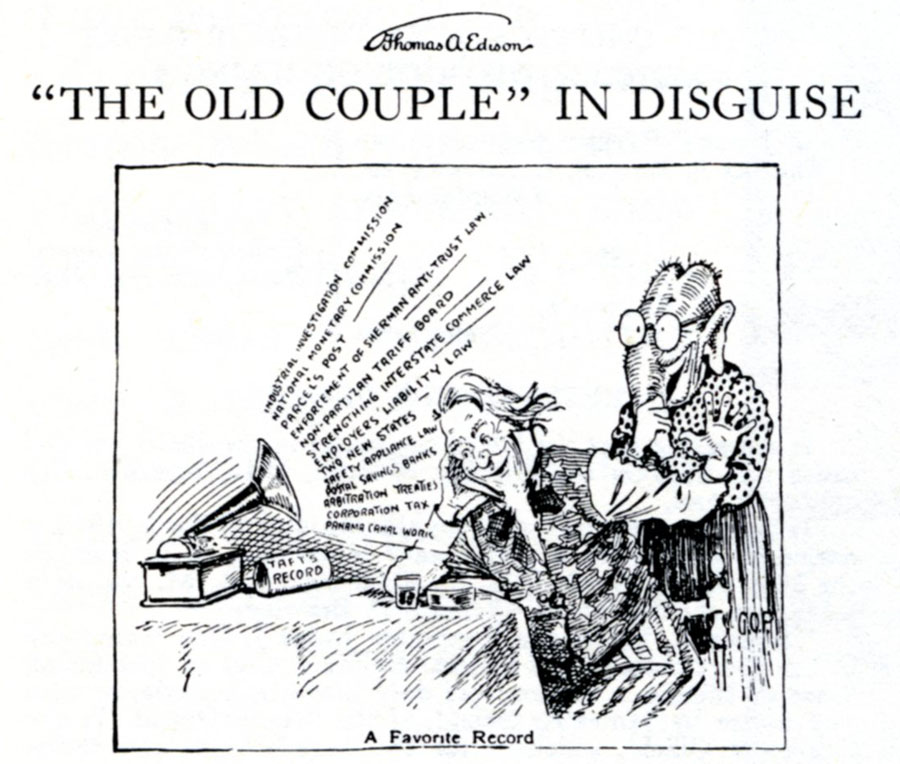
"A Favorite
Record - Taft Records" The Edison Phonograph Monthly,
May 1912
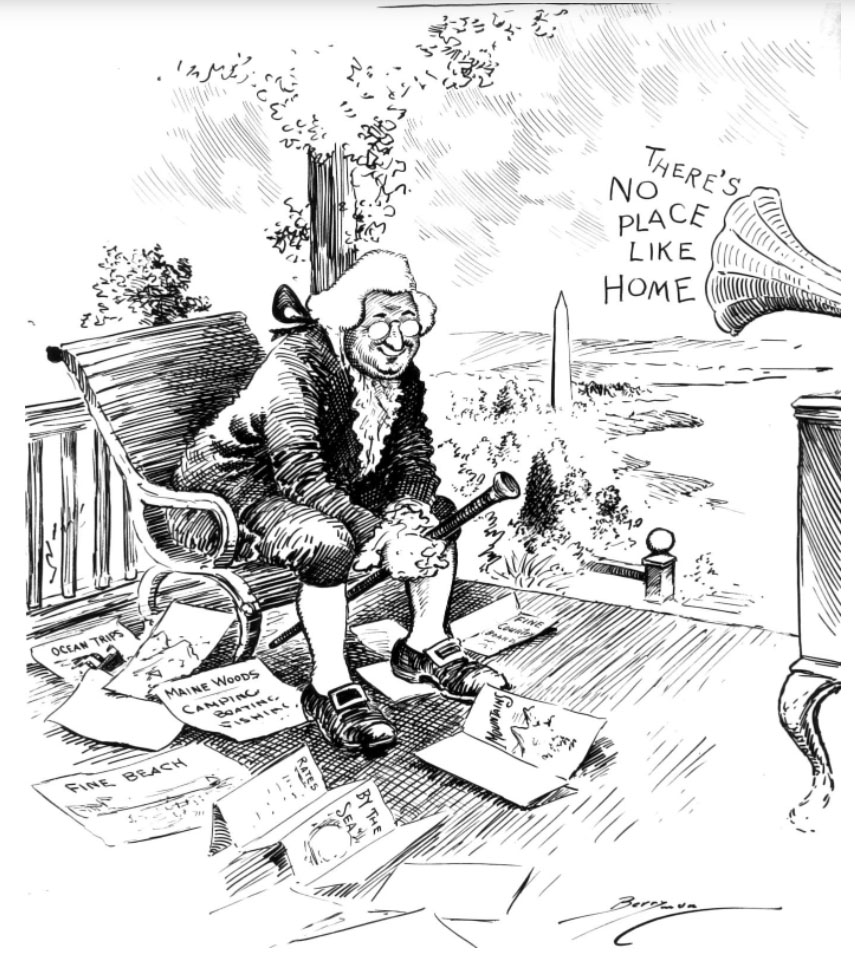
"A Favorite Tune,"
January 7, 1914, Berryman Political Cartoon Collection, The U.S. National
Archives

The Saturday Evening
Post, September 4, 1954
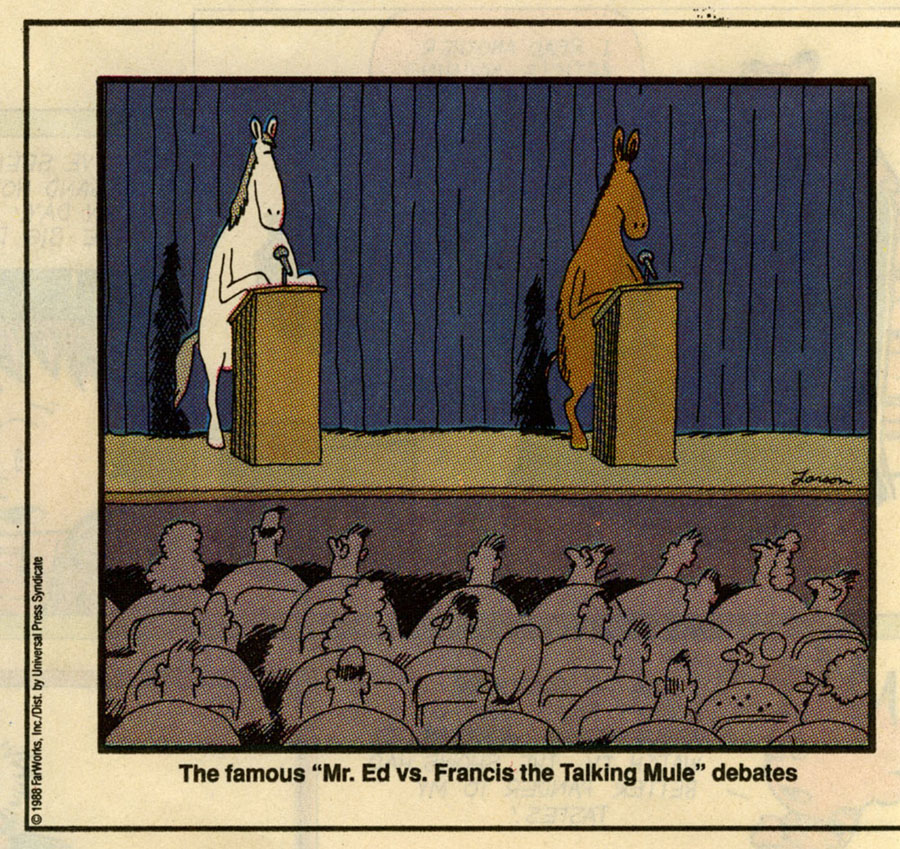
©1988 FarWorks,
Inc.

Go Reagan! December
13, 2003 Dave Blazek
Following the 2020 Presidential
Election and the continual refusal of Trump to concede the election,
Jimmy Kimmel made this observation about Trump:
“Trump’s like the guy who
puts 20 plays of ‘Achy Breaky Heart’ on the jukebox before he leaves
the diner.” — JIMMY KIMMEL (November 10, 2020)

Phonographia
|